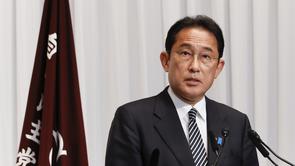 Japan's Prime Minister and Liberal Democratic Party leader Fumio Kishida, left, speaks during a news conference at the party headquarters in Tokyo, Nov 1, 2021. (RODRIGO REYES MARIN/POOL PHOTO VIA AP)
Japan's Prime Minister and Liberal Democratic Party leader Fumio Kishida, left, speaks during a news conference at the party headquarters in Tokyo, Nov 1, 2021. (RODRIGO REYES MARIN/POOL PHOTO VIA AP)
Japanese Prime Minister Fumio Kishida will have no time to rest on his laurels after his ruling party maintained its majority in legislative elections on Sunday.
While the win could be read as a vote of confidence in the new leader, Kishida faces plenty of challenges in carrying out the Liberal Democratic Party's policies.
"Kishida has to be commended for his efforts to keep the Liberal Democratic Party firmly in charge with the election win," said Yu Qiang, a professor of Japan studies at the University of International Relations in Beijing. "But it is still too optimistic to believe that he had won backing from the public and inside the LDP, because he has not yet promoted any agenda."
Staring down media commentary and opinion polls that suggested that the LDP would lose its simple majority in the House of Representatives, Kishida secured 261 seats in the 465-seat lower house of parliament-down from the 276 the LDP held before the election.
(Prime Minister Fumio) Kishida has to be commended for his efforts to keep the Liberal Democratic Party firmly in charge with the election win ... But it is still too optimistic to believe that he had won backing from the public and inside the LDP, because he has not yet promoted any agenda.
Yu Qiang, professor of Japan studies at the University of International Relations in Beijing
But the margin is enough for the party to control almost all the parliamentary committees and to push through any contentious legislation without help from its coalition partner Komeito.
Before Sunday, the outlook was far from bright for the party, with indications the result would be close.
ALSO READ: Kishida hangs on to majority in Japanese election despite losses
Conditions were not ideal for Kishida. He took over the LDP's presidency from Yoshihide Suga at a time when the longtime aid of Shinzo Abe, Japan's longest-serving prime minister, resigned just one year into the job.
He was criticized over his handling of the COVID-19 crisis and the failure of so-called Abenomics, a stimulus program, to revive the country's stagnant economy.
As a result, Kishida's administration started with a 45 percent approval rating, the third-worst inaugural rating among nine prime ministers with comparable data dating back to 2002 and even 20 percent less than what people gave Suga when he took office.
Also, the main opposition Constitutional Democratic Party of Japan, or CDPJ, teamed up with several parties, including the Japanese Communist Party, to introduce unified candidates. The strategy resulted in tight races in many constituencies.
Considering that the CDPJ lost 13 seats in the election, the strategy can be judged a failure.
Yukio Edano, head of the CDPJ, said on Tuesday that he would resign following the poor results. "It's very unfortunate that we lost seats and I want to apologize," he said.
Still, Kishida's victory came with costs. Akira Amari, the architect of Japan's new economic security policy and No 2 figure inside the ruling party, became its first secretary-general to lose his constituency seat.
ALSO READ: Japan's Kishida defies forecasts, keeps majority in election
On Monday, Kishida replaced Amari with Foreign Minister Toshimitsu Motegi.
'Honor the trust'
"I think it's important that I make sure we can honor the trust invested in us by the people," 66-year-old Motegi told reporters after accepting the appointment.
Yu said: "Amari's defeat is a symbolic one showing the LDP lacks policy ideas to energize the public."
The academic added that Kishida needs to generate some momentum for his policies to be carried out, with an election in the legislature's upper house next year.
Kishida seems to be well aware of what's at stake. After the election victory, he said: "It was a tough election. We need to take the many criticisms seriously … and we will be implementing our policies with a sense of speed."
In his first policy speech, Kishida stressed his determination to promote "a new form of capitalism" as the main pillar of his initiatives in which economic expansion will be achieved by distributing the fruits of growth.
ALSO READ: Japan stimulus likely to show Kishida's true spending colors
Erbiao Dai, vice-president of the Asian Growth Research Institute in Fukuoka, said: "Extricating the country from deflation, realizing a virtuous cycle of growth and distribution with various pillars to support them were the key points of Kishida's policy speech."
Dai said Kishida's "new form of capitalism" faces several problems.
"Japan's economic growth has not shown significant improvement in recent years, so it is not a good time to emphasize distribution when the pie was not made large enough," Dai said.
READ MORE: Japan's Kishida to forge ahead with economy plans after win
"Then, Kishida is not a fan of neoliberal economic policy but in return for the support of LDP heavyweights like Shinzo Abe in the presidential election, he promised to continue Abenomics," the scholar said. "And because of this, left-wingers think Kishida's words and deeds are likely to be inconsistent while conservatives criticize his idea of taking from the rich and helping the poor as socialism."


